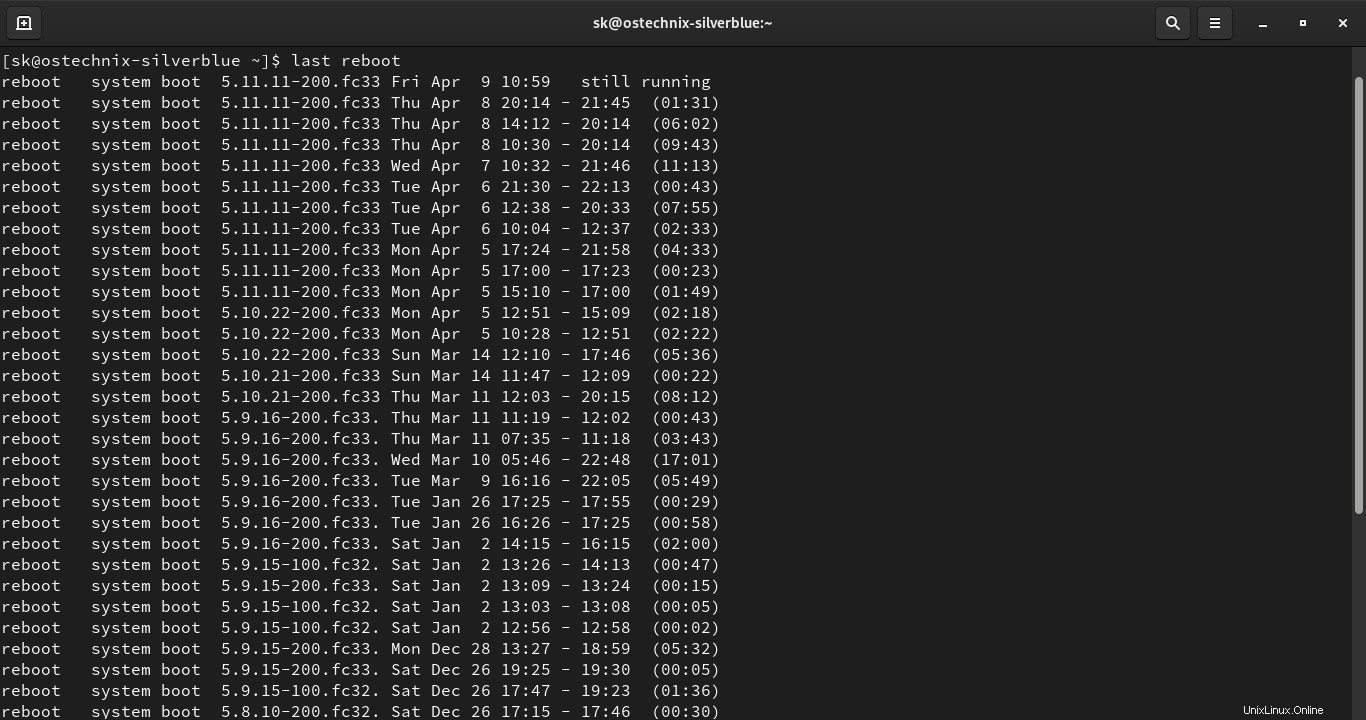この簡単なガイドでは、Linuxシステムを再起動したユーザーと最後の再起動時刻を確認する方法について説明します。このトリックは、マルチユーザー共有サーバーを管理している人に役立つ可能性があります。
Linuxシステムを再起動した人を見つける
Linuxサーバーを誰が再起動したかを確認するには、 psacctをインストールする必要があります。 ユーティリティ。ユーザーのアクティビティを監視するために使用されます。 psacctの詳細については、次のリンクを参照してください。
- Linuxでユーザーアクティビティを監視する方法
psacctをインストールした後、以下を実行して、Linuxサーバーを再起動したユーザーを見つけます。
$ lastcomm reboot
サンプル出力は次のようになります:
reboot sk pts/0 0.00 secs Mon Apr 3 15:05 reboot S X root __ 0.00 secs Mon Apr 3 15:00 reboot sk pts/0 0.00 secs Mon Apr 3 15:00
上記のように、「sk」というユーザーが、4月2日月曜日の現地時間15:05に「pts0」から「reboot」コマンドを実行しました。
待ってください、まだ終わっていません。
上記のコマンドは、前回の再起動の3つの結果のみを表示します。次のコマンドを実行すると、完全な再起動履歴を表示できます。誰がシステムを再起動したかは表示されないことに注意してください。代わりに、前回の再起動の日時のみが表示されます。
$ last reboot
出力例:
reboot system boot 5.11.11-200.fc33 Fri Apr 9 10:59 still running reboot system boot 5.11.11-200.fc33 Thu Apr 8 20:14 - 21:45 (01:31) reboot system boot 5.11.11-200.fc33 Thu Apr 8 14:12 - 20:14 (06:02) reboot system boot 5.11.11-200.fc33 Thu Apr 8 10:30 - 20:14 (09:43) reboot system boot 5.11.11-200.fc33 Wed Apr 7 10:32 - 21:46 (11:13) reboot system boot 5.11.11-200.fc33 Tue Apr 6 21:30 - 22:13 (00:43) reboot system boot 5.11.11-200.fc33 Tue Apr 6 12:38 - 20:33 (07:55) reboot system boot 5.11.11-200.fc33 Tue Apr 6 10:04 - 12:37 (02:33) reboot system boot 5.11.11-200.fc33 Mon Apr 5 17:24 - 21:58 (04:33) reboot system boot 5.11.11-200.fc33 Mon Apr 5 17:00 - 17:23 (00:23)

Linuxシステムを再起動した人を見つける
また、次のようなBASH履歴ファイルを確認することで、どのユーザーがLinuxボックスを再起動したかを確認できます。
$ grep reboot /home/*/.bash_history
上記のコマンドは、すべてのユーザーの.bash_historyファイルを調べ、システムを再起動したユーザーを表示します。
/home/sk/.bash_history:reboot /home/sk/.bash_history:sudo reboot /home/sk/.bash_history:reboot /home/sk/.bash_history:sudo reboot /home/sk/.bash_history:sudo reboot /home/sk/.bash_history:reboot
特定のユーザーを検索するには、以下に示すようにユーザー名を指定するだけです。
$ grep reboot /home/sk/.bash_history
このコマンドは、「sk」というユーザーに属する.bash_historyファイルのみを調べます。すべてのユーザーのアクティビティを監視することを常にお勧めします。誰があなたのシステムを壊そうとしているのか、あなたは決して知りません。 rootユーザーのパスワードを定期的に変更してください。 ユーザーのアクセスを制限する Linuxシステムに接続し、パスワードポリシーを設定 セキュリティ違反を回避するためにユーザーに提供します。
ダウンロード -無料のチートシート:「Linuxコマンドラインチートシート」
これがお役に立てば幸いです。